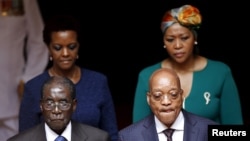It has been more than two decades since Zimbabwe’s President Robert Mugabe paid a state visit to neighboring South Africa.
Mugabe returned Tuesday to a South Africa that has changed considerably since his last state visit in 1994. Since then, South Africa has transformed itself from a global pariah over its apartheid system of racial separation into the "Rainbow Nation" of today.
Mugabe has changed, too. The man once hailed as a tireless liberation leader showed his indefatigable nature by energetically running for - and dubiously winning - election after election, allegedly rigging polls, committing human rights abuses and destroying his nation’s economy along the way.
In 2013, Mugabe was elected to his seventh term in a poll that some observers said was flawed. Those events have created a chill between him and the international community.
Frosty relations
But independent analyst David Monyae said this visit may represent the first thaw in Zimbabwe’s frosty diplomatic relations.
Monyae said one reason is that Mugabe, who recently became head of both the African Union and the Southern African Development Community, is a little too important to keep ignoring. Also, he noted, Zimbabwe may be turning a corner.
“It signals the start of the stabilization of Zimbabwean politics on one hand and slow coming out of the economic crisis as Zimbabwe engages with the international community. … President Robert Mugabe is currently the chair of SADC as well as the chair of the African Union. So he holds two critical positions in the African continent. That’s his leverage on quite a number of issues," Monyae said.
The official reason for this visit, which started Tuesday, is to strengthen economic cooperation between the two nations, said South Africa’s foreign ministry. Since Zimbabwe began its economic decline in the early 2000s, the balance of trade has swung decisively in South Africa’s favor.
And so, the man known for his fiery invective may have to bring out the begging bowl on this visit, Monyae said. The visit comes ahead of an SADC summit hosted by Zimbabwe, which the nation is reportedly struggling to pay for.
“I think it’s just speculation. But even if it is true, I won’t be surprised, given the economic crisis in the country, and therefore, like any other head of state, he would go around shopping and asking for help to host a gathering which is costing," he said.
But Mugabe’s visit is not without controversy. South Africa has the world’s highest population of Zimbabwean expatriates. About 200,000 of them are now trying to renew their asylum permits after fleeing here in the aftermath of the nation’s violent 2008 elections.
Ngqabutho Mabhena, a South Africa-based member of one of Zimbabwe’s two top opposition parties, is one of those Zimbabweans.
Critical of management
Mabhena is not thrilled about the president’s visit.
“He comes on his first visit since 1994 when the majority of Zimbabweans are basically here in South Africa in the middle of trying to make a livelihood thanks to his poor management of the economy in Zimbabwe," Mabhena said.
"So he comes really during, in the middle of what one would call an economic crisis in Zimbabwe where the Zimbabwean government has run short of ideas on how to resuscitate the economy. So we don’t know what he is going to get out of South Africa during this state visit," he said.
Mabhena is one of many Zimbabweans hoping that Mugabe’s visit here may be a prelude for his final act. A recent column in the state-run Herald newspaper, widely believed to be written by Mugabe's spokesperson George Charamba, said: “Soon he will bow out, like all mortals.”
That statement is causing a lot of head-scratching, Mahbena said. "It’s not clear whether Mugabe will go out in the next two weeks, in the next month, will he not be available in 2018? We are actually trying to understand what that statement means ourselves," he said.
Mugabe has dismissed notions that he is restricted by term limits or even this mortal coil, famously saying: "I have died many times - that's where I have beaten Christ. Christ died once and resurrected once."
Apt words, from the Zimbabwean ruler. This visit, which ends Thursday, is something of a diplomatic revival for one of Africa’s most tenacious leaders.




